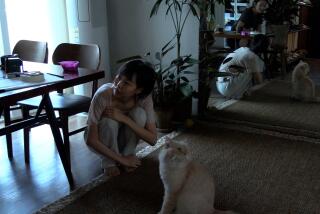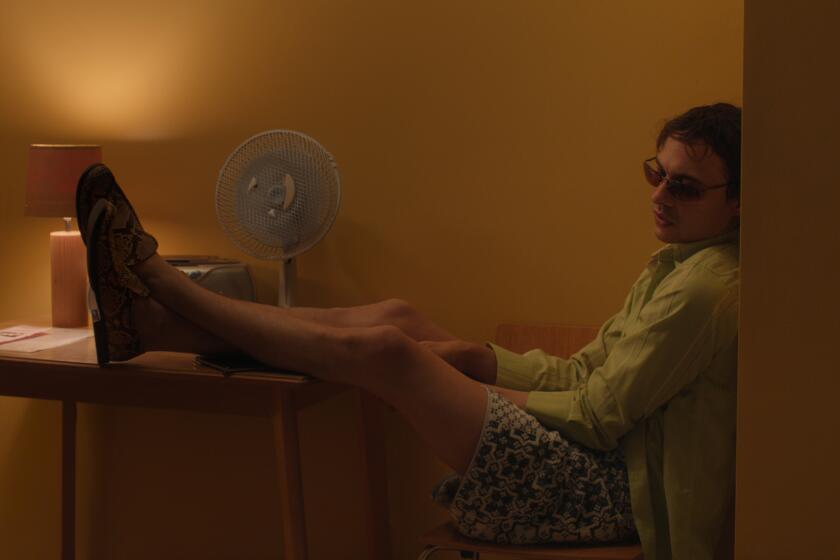AFI Fest spotlights South Korean cinema
- Share via
This year’s international film festival circuit has been a showcase for South Korean cinema, with a handful of major filmmakers delivering new works alongside first-time directors making notable debuts. AFI Fest, which kicked off Thursday in Hollywood, spotlights six films from this wave.
In the festival’s World Cinema section are “Hahaha” (a prize winner at Cannes) and “Oki’s Movie,” two films by Hong Sang-soo, known for his candid explorations of the complexities of modern everyday life. Im Sang-soo’s steamy remake of “The Housemaid” will screen along with Kim Ki-young’s 1960 original. Also showing is Lee Chang-dong’s lyrical and reserved “Poetry,” which just picked up four awards, including best picture, at the Grand Bell Awards, South Korea’s equivalent to the Oscars.
In the festival’s New Auteurs section is debut director Jang Cheol-soo’s revenge thriller “Bedevilled,” which recently won a Grand Bell for new director and took home two awards at Austin’s genre-oriented Fantastic Fest. (Kim Jee-woon’s feverishly bloody “I Saw the Devil” had also been announced to screen at the festival but was pulled from the lineup at the last minute by the film’s U.S. distributor, Magnet Releasing, because of scheduling issues.)
“We try to have a broad selection of all geographical regions,” said Lane Kneedler, AFI Fest’s associate director of programming, noting that although more films from South Korea are screening this year, there are fewer Latin American films than in 2009. “At the end of the day, the quality of the films is what matters more than anything. These films are all of such high quality we felt strongly about showing them.”
South Korean films began making a mark on the international festival circuit — as well as some inroads in the American art house market — in the mid- to late 1990s. When Park Chan-wook’s flamboyantly violent “Oldboy” took the Grand Prix at the 2004 Cannes Film Festival, it solidified South Korean filmmaking in world cinema circles.
The selection of South Korean films screening at AFI Fest shows off the breadth of work emerging from the country, from the contemplative pieces of filmmakers like Hong to the wild genre inversions of Jang.
“Usually when you get a film culture that’s hot for a while, like say Iran or Romania, you don’t get the full range of movies,” said John Powers, critic for Vogue and NPR who was formerly on the selection committee for the New York Film Festival, which has been a key venue for bringing recent Korean filmmaking to America. “Where let’s say you start with Hong Sang-soo — verbal, refined, super low-budget — and at the other end you have Bong Joon-ho [director of “The Host”] and Park Chan-wook. There’s also a whole range of stuff in between, all of them with a new level of consciousness about Korean history, Korean culture, what’s going on.”
Sunday’s double feature of the 1960 version of “The Housemaid” and the 2010 remake, which had its premiere at Cannes this year, will highlight the shift in consciousness toward social concerns. Both films tell the same story of a young housemaid whose presence creates tension within the family she attends to, but the shades of difference between the two reflect changes in attitudes toward women, sex, power and affluence.
“The original ‘Housemaid’ is quite famously an influential film on the current crop of Korean filmmakers, and it’s easy to see why,” said Martin Cleary, editor of the British-based website New Korean Cinema. “It’s an intense cautionary melodrama which reflects the political and social climate of the time. It’s still a genuinely shocking film at times, and you can clearly see its influence in recent releases.”
For Im, director of the new version of “The Housemaid” and perhaps best known for his 2005 assassination drama “The President’s Last Bang,” the shifts in emphasis between the original and his remake, the chance to explore cultural changes in South Korean society, were the very reasons to undertake the project.
“I hope that art will become the critical device to comment on the mental stability of the general population,” he said via e-mail. “If one’s only reason to make a film is to generate maximum profit, you should not go to such trouble.”
That interest in exploring contemporary social and political undercurrents in South Korea doesn’t serve to make the new films inaccessible to American audiences; rather, it provides an interesting point of entry.
“Their filmmaking speaks to people in a way that American movies maybe spoke to people in the 1970s,” said Powers, “where it was actually about something to do with their lives.”
More to Read
Only good movies
Get the Indie Focus newsletter, Mark Olsen's weekly guide to the world of cinema.
You may occasionally receive promotional content from the Los Angeles Times.











